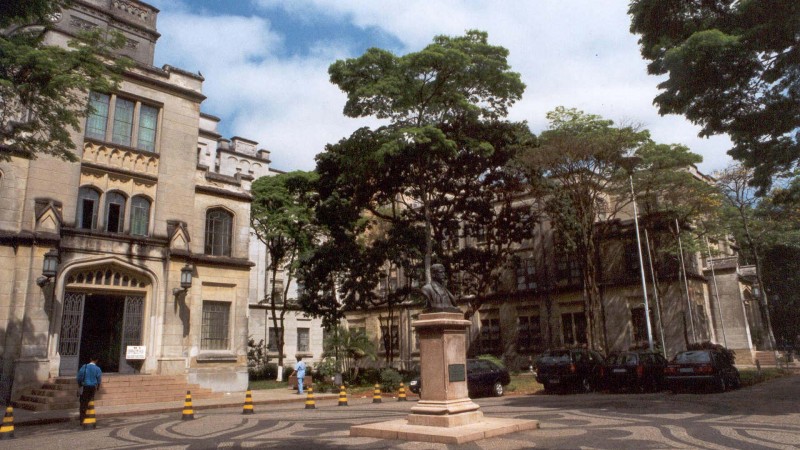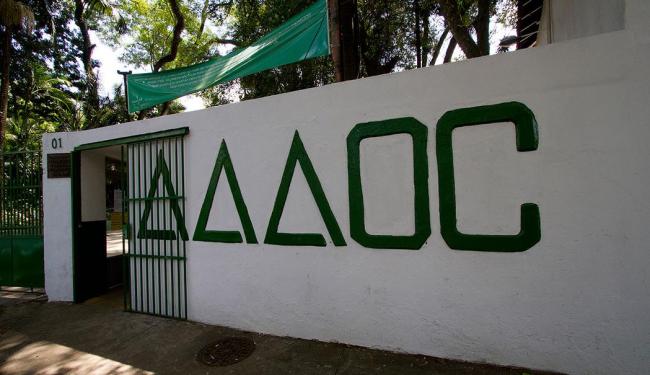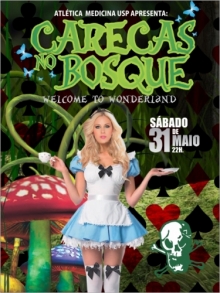
Founded in 1912, the Medicine College of the University of São Paulo is one of Brazil's most traditional schools. Image by USP Imagens. CC BY-NC 3.0 BR
Brazil’s most prestigious university is facing accusations that it failed to investigate the rape of one of its students and the sexual assault of another — and pressured the victims not to report the incidents for the sake of the school's reputation.
At a public hearing this month in the São Paulo Legislative Assembly, two female undergraduates from FMUSP, the medicine college of University of São Paulo, came forward with their reports of sexual abuse while attending parties on campus.
An investigation opened by the human rights district attorney in the São Paulo public prosecutor’s office cites eight rape cases that took place in the school since 2011. Both the hearing and the investigation are looking into sexual violence, racism, discrimination and other human right abuses at the institution. Amidst the scandal and media attention, FMUSP has suspended all parties on its campus until further notice.
One of the students says she was raped in 2011 while she was unconscious at the party “Carecas no Bosque” (“bald heads in the woods”). The party is organized by the Academic and Athletic Association Oswaldo Cruz, one of the main FMUSP student organizations, which has existed since 1928.
In an account given to website UOL, she said that after having too much to drink a friend took her to a place called “cafofo” – closed structures with mattresses that serve as a place for couples to hook up – where she passed out. Shortly after, a man was seen raping her while she was unconscious, a fact she learned after waking up at a hospital hours later.
She said during the week that followed she was systematically discouraged by both classmates and faculty to report her rape to authorities:
Na faculdade, diziam que eu ia destruir a Atlética, que isso [o estupro] não podia vazar. Um ex-presidente da Atlética disse: “a gente precisa abafar: primeiro, para proteger a vítima e, segundo, porque isso vai destruir a festa”. Eu procurava as pessoas para saber se testemunhariam, e eu sentia que elas se mostravam receosas e esquivas. Todo mundo falava que eu tinha que deixar isso para trás, que tinha que tocar a minha vida para a frente. Chegavam a falar que eu não ia conseguir provar.
In the school, they said I was going to destroy the Academic and Athletic Association Oswaldo Cruz, that the story could not leak. An ex-president from the association said, “We need to silence it. First, to protect the victim and, second, because this will destroy the party.” I would ask people if they would testify, and I sensed they were fearful and evasive. Everyone said that I had to leave it behind me, to get on with my life. They said I wouldn’t be able to prove it.
She decided to take the case to the police anyway. But three years into the investigation, authorities haven't convicted anyone, though after the public hearing a suspect was charged. She said the FMUSP board of directors took notice of the case, but did nothing:
“Até hoje, quando o inquérito policial está sendo finalizado, eu descubro coisas sobre meu caso que não sabia, por exemplo, que a diretoria da Atlética não permitiu que a polícia entrasse no local da festa”.
Even today, while the police inquiry is being concluded, I found out things about my case that I didn’t know before. For example, that the directors of the association didn’t let the police enter the party.

The Academic and Athletic Association of the Medicine College of USP, one the main student organizations. Image by USP Imagens. CC BY-NC 3.0 BR
The other student who agreed to talk at the public hearing says she was abused by two men in November 2013 during another party organized by seniors at the Student Academic Center. It started when they insisted she go to the parking lot with them:
“Eu falava que não queria, eles insistiam para eu ir. Me puxavam, mas eu não queria ficar com eles. Nesse vai e vem acabamos chegando ao carro deles. Lá eles começaram a me beijar, enfiar a mão dentro da minha roupa, dentro da minha calça. Queriam que eu entrasse no carro, abriram a porta, e eu comecei a gritar, a fazer um escândalo, dizendo que não queria. Tentava sair e eles impediam a minha passagem. Me empurravam, e um deles começou a gritar comigo: ‘para de gritar, para de gritar!’. Eu dizia que não queria os dois e um deles respondia: ‘você quer sim, eu sei que você quer, deixa de ser chata’. E os dois me beijavam, passavam a mão em tudo, não me deixavam sair. Nisso uma menina que estava no estacionamento brigando com o namorado viu o que aconteceu, deu um grito e me chamou. Então consegui sair.”
I said I didn’t want to go, but they insisted. They kept pulling me, though I didn’t want to hook up with them. When we arrived by the car, they tried to kiss and fondle me. They wanted me to get into the car, they opened the door and that’s when I started to scream and make a scene, saying that I didn’t want to. I would try to get out and they would hold me, they pushed me and one of them said “stop screaming!” I said I didn’t want to hook up with either of them and they said, “Yes, you do, I know you do, stop being such a drag.” A girl who was also in the parking lot saw what was going on and shouted to me. That’s when I managed to get out.
Once she reported the case to the school, a commission of four professors was created. Six months later, it concluded that the interaction was consensual and the problem was alcohol consumption. She says she has been harassed by other students ever since – one of her abusers even threatened to sue her for defaming him:
“Após mais de um ano os caras continuam impunes e eu cruzo com eles quase todos os dias. Sou tida como uma vagabunda na faculdade.”
A year later, they haven't been punished and I see them almost every day. I am seen as a slut at the school.
Culture of violence
Although this is the first time the University of São Paulo's medicine school has faced such accusations, it has long had a reputation for its violent “trotes” – a ritual organized by seniors to mark the entrance of freshman students in the school. In 1999, one case gained national notoriety when 22-year-old freshman Edison Tsung Chi Hsueh died during a a “trote” after being pushed into a swimming pool and left there, despite his protests that he couldn’t swim. After a long court battle, the four men accused were found not guilty in 2006 by Brazil's Supreme Court due to lack of evidence.
In 2013, a group of FMUSP female students founded Geni, a feminist collective that also serves as a support group for survivors of sexual violence. Although Rosa and Leandra’s cases were the only ones taken to the police, Geni has received reports of at least eight other cases of campus sexual abuse.
A student that chose to remain anonymous told website Ponte that the problem is the extremely sexist environment at the parties, which encourages men to believe that any girl who in attendance is also available:
“Todo o marketing é baseado no fato de que lá haverá muitas mulheres e que vai ter sexo à vontade. A USP inteira sabe que tanto a ‘Carecas’ quanto a ‘Fantasias’ são para isso, para ir lá e transar”
The whole marketing of the party is based on the idea that there will be many women there and there will be sex for everybody. The whole university knows that the purpose of both “Carecas” and “Fantasias” is just that, to go there and get laid.
The parties “Carecas” and “Fantasias”, which happen alternately every semester, charge female guests almost half the price of their males counterparts for a ticket. The idea is that male teams of each sport would put up tents to sell drinks and raise funds, but students reported that in some of them hired prostitutes do strip teases and body shots, or porn movies are played; one team calls its tent “slaughter house”.
Marina Pinkman, from Geni, said representatives of the collective have tried to meet with the directors of the Academic and Athletic Association Oswaldo Cruz to insist that measures be put into place so that female students aren't so vulnerable at their parties. The association responded that nothing will be done before a court ruling is made:
As meninas não reclamam muito, fica velado, pois ninguém tem coragem de criticar a Atlética, porque é uma instituição muito forte. Existe um corporativismo muito grande envolvendo a Atlética, ou o Show Medicina. Você vai ser perseguido se reclamar, se der a cara para bater”
The girls don’t complain much, everything is veiled as no one has the guts to criticize the association since it’s a very powerful institution. The association and Show Medicina [another student entity] are only out for themselves. You’ll be harassed if you complain.

One of the posters for the “Carecas no Bosque” party. “The whole marketing is based on the idea that there will be women available for sex”, one student comments.
The eight cases that reached Geni were taken to the Public Prosecutor for Justice in Human Rights and Social Inclusion, Paula de Figueiredo Silva, who opened a civil inquiry in August to investigate human rights violations at the school. She told news portal Terra:
“A princípio achei que fosse um caso pontual, mas é um relato amplo, de uma realidade de violações constantes de direitos fundamentais das minorias. Existe (na faculdade) uma realidade de discriminação e exclusão, principalmente contra mulheres e homossexuais”
At first I thought they were isolated cases, but they’re actually widespread and stem from a reality of constant violation of fundamental rights. There is (in the school) a reality of discrimination and exclusion, especially against women and homosexuals.
FMUSP issued an official statement saying it is “making efforts to improve its mechanisms of preventing such cases, investigating reports and protecting victims.” It also stated the the “culture of the institution is based on tolerance and mutual respect, values that are passed to the students.” The school said it will present a full report next week on all the sexual abuse, rape and violent “trotes” cases that have taken place at the institution.
Another hearing is scheduled for November 25 in the São Paulo Legislative Assembly, to which representatives from the Academic and Athletic Association Oswaldo Cruz are invited to attend.







1 comment